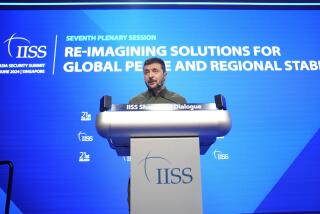Baker Predicts Saudis Will Skip Mideast Talks
- Share via
AQABA, Jordan — Saudi Arabia, the economic anchor of four decades of Arab hostility to Israel, probably will skip a proposed Middle East conference, in effect narrowing the focus of the U.S.-backed peace process to Israel and its immediate neighbors, Secretary of State James A. Baker III said Saturday.
Although Baker said the Saudis have not flatly refused to attend the conference, their reluctance to do so can be expected to tarnish the luster of the process for Israel, which had hoped to use the meeting as a forum for face-to-face talks with the major nations of the Arab world.
The development came as the Israeli regime was expressing its own misgivings about Baker’s peace initiative. A four-hour meeting Friday between Baker and Israeli Prime Minister Yitzhak Shamir failed to resolve nagging procedural problems that could scuttle the entire conference proposal before it has a chance to begin.
The surprise announcement that Saudi Arabia, which had been generally considered to be a firm supporter of Baker’s approach, is now holding back, overshadowed a cordial meeting between Baker and King Hussein that seemed to rehabilitate Jordan’s relationship with the United States.
Standing side-by-side in front of Hussein’s winter palace at this Red Sea resort, Baker and the monarch both expressed cautious optimism that the two countries will restore their once-close ties, which were badly shaken by Hussein’s sympathy for Iraq during the Persian Gulf War.
Hussein spoke glowingly about the prospect that Israel and its Arab neighbors could settle their differences at the conference table, although he seemed to stop short of an unequivocal commitment to attend.
The monarch said it is time to move beyond the old “taboos” that have soured the Arab-Israeli relationship.
Asked directly if he would attend a regional conference, Hussein said: “I don’t know what its name will be. Will it be a peace conference? . . . This is still something that the secretary is involved in and our friends in the world are concerned with. . . . People should talk.”
Baker’s aides tried to minimize the impact of the secretary of state’s comments about Saudi participation in the proposed conference. One senior State Department official said that no country is either definitely in or out yet.
Participation is a key issue on the agenda of Baker’s current round of talks in Israel, Jordan, Saudi Arabia, Kuwait and Syria, the official said.
In his joint press conference with Hussein, Baker said Saudi Arabia and the other oil-rich states along the Persian Gulf are unlikely to attend because their dispute with Israel is less pressing than is the conflict of states located on Israel’s borders.
“I think there is a feeling on the part of the sometimes called ‘front-line states,’ or the states neighboring Israel, that the issues in dispute are issues that affect Israel and those states and issues that affect Israel and the Palestinians,” He said. “If you bring other Arab states to the table . . . where do you draw the line?”
Meanwhile, an Administration official dismissed as “a tad ludicrous” Israeli complaints that Baker had reneged on an earlier acceptance of Israeli demands to limit the proposed conference to a ceremonial opening and to bar Arab residents of Jerusalem from the Palestinian delegation to the talks.
The official said there were no earlier commitments, just an agreement by Baker to present Israeli views to potential Arab participants. The Arabs, in turn, demanded changes that Baker relayed to Jerusalem.
“You don’t solve this problem by agreements between the United States and Israel,” the official said. “You have to work to produce agreements between Israel and the Arabs. . . . You have to bring back, as we have, what the Arab states see as the essential elements of a solution and that’s exactly what we have done.
“Of course, I totally reject suggestions that we have reversed field on commitments,” the official said. “As we get closer here, the decisions get tougher, and I think that’s what you are seeing.”
Baker began Saturday with a meeting in Jerusalem with three Palestinian leaders, moved on to a two-hour session with Hussein and finished the day in Cairo. He is to meet Egyptian President Hosni Mubarak today before going on to Saudi Arabia. On Monday he visits Kuwait and on Tuesday he plans possibly crucial talks with Syrian President Hafez Assad in Damascus.
U.S. officials apparently have known for several weeks that Saudi Arabia is an unlikely participant in a regional peace conference. Nevertheless, President Bush dispatched Baker on his third Middle East shuttle mission in six weeks in an attempt to capitalize on Washington’s Persian Gulf War victory. Officials said that Saudi Arabia has a role to play in the peace process even if the kingdom is not represented at the conference.
Baker, who earlier called for the Arabs and the Israelis to make “confidence-building” gestures as a way to get the peace process started, said Saturday that the steps that each side wants most are unlikely to occur unless there is significant progress toward peace first. For the Arabs, the key confidence-building measure would be an end to the construction of Jewish settlements in the occupied West Bank and Gaza Strip, and for the Israelis, the key step is an end to the Arab economic boycott of Israel.
“We see settlements as an obstacle to peace,” Baker said.
More to Read
Sign up for Essential California
The most important California stories and recommendations in your inbox every morning.
You may occasionally receive promotional content from the Los Angeles Times.













